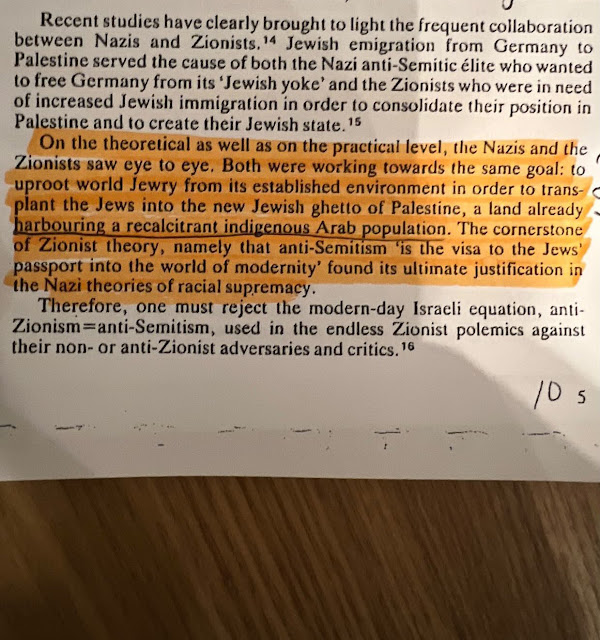But Massad knows that everyone knows that is a lie besides dyed in the wool antisemites who call Jews "Khazars."
So he has come up with a new argument: that the self-determination argument was never a Zionist tenet, rather it was a Palestinian Arab one.
Since the inception of their war against the Palestinian people, Zionist ideologues did not argue for Jewish self-determination but rather sought to delegitimise the indigenous Palestinians’ right to it. In the tradition of all colonial powers which denied that the colonised were a nation, the Zionists began by denying the nationness of the Palestinians.
Actually, the Zionists didn't even address the "nationness" of the Palestinian Arabs, who themselves didn't assert such a status (except for a tiny number of intellectuals) until decades after Zionism was established.
At the Paris Peace Conference at the end of World War I, the Zionist Organisation (ZO) did not invoke any "Jewish" right to self-determination, even though self-determination was all the rage at the conference, with colonised peoples from around the world affirming this right to liberate themselves from the colonial yoke.
The ZO instead argued that Palestine "is the historic home of the Jews…and through the ages they have never ceased to cherish the longing and the hope of a return".
Massad takes this statement out of context. The ZO's proposals were not meant to be a definition of Zionism, rather recommendations to the allies with an eye to what was politically possible. Even so, they did use the language of rights in their suggested conference statement: "The High Contracting Parties recognize the historic title of the Jewish people to Palestine and the right of Jews to reconstitute in Palestine their National Home. "
Massad then makes an astoundingly incorrect assertion:
It is most important to note in this regard that, unlike the more recent and increased use by Zionists of the notion of Jewish self-determination, neither Herzl’s writings, the 1897 first Zionist Congress, the Balfour Declaration of 1917, nor the 1922 Palestine Mandate employed the language of "rights", let alone the right of self-determination.
Herzl's definition was "Zionism has for its object the creation of a home, secured by public rights, for those Jews who either cannot or will not be assimilated in the country of their adoption."
The phrase "public rights" was coined by Italian jurist Pellegrino Rossi in the 1830s. It meant universal rights for people - what it now called human rights. Herzl's definition of Zionism was based on the idea that Jews have the same rights as any other people, which would by implication include self-determination, a phrase that didn't gain popularity until the 1910s.
Massad cherry picks specific documents and statements and says that because they don't invoke "rights' or "self-determination,"then Zionists as a whole didn't use that language until recently. That is laughable.
A book on Zionism and the Jewish question by famed juror Louis Brandeis in 1915 says, "Jews collectively should enjoy the same right and opportunity to live and develop as do other groups of people."
Similarly, Jessie Ethel Sampter published "A Course in Zionism "in 1915, and wrote, "The Jew is always foremost in every modem movement towards justice. In the 18th century he fought for individual human rights, as his rights. In the 20th century he fights for the rights of the small nations to life and autonomy, also as his right. It is the democracy of nations, internationalism. "
Massad is even wrong in his assertion that self-determination is a new claim by Zionists. "A Jewish State in Palestine" by David Werner Amram (1918) says that the Zionist movement was partially a result of the "consciousness of the right of self-expression and self-determination of the Jewish people." The phrase did not have to be said explicitly by the early Zionists; it was well understood as one of many national rights that Jews should have as a people.
Similarly, the preface to a book written by the Zionist Organization in London in 1918 says, "Only by their resettlement in their ancestral land of Palestine...will the Jews be able to exercise the right of self-determination."
Early Zionists always asserted their national rights as the Jewish nation as well as the right of self-determination. It is not a new phenomenon. Massad's pretense that this is a new definition of Zionism is yet another failed attempt to delegitimize Zionism - and to push his brand of modern antisemitism.


 Elder of Ziyon
Elder of Ziyon

 Buy
Buy 


.jpg)






















.jpg)




